The trial of a former Minister of State for Finance, Nenandi Usman, who is facing a corruption charge, continued on Friday at a Federal High Court in Lagos with the third prosecution witness, head of a bank’s branch, giving more evidence.
The Economic and Financial Crimes Commission (EFCC) is prosecuting Usman alongside Femi Fani-Kayode, a former Minister of Aviation and the Chairman of the 2015 Goodluck Jonathan Presidential Campaign Organisation.
Others are a former National Chairman of the Association of Local Government of Nigeria (ALGON), Yusuf Danjuma and a company — Jointrust Dimentions Nigeria Ltd.
EFCC slammed a 17-count charge bordering on laundering of N4.6 billion.
They, however, pleaded not guilty to the charges and were granted bails.
However, at the resumed hearing of the case on Friday, Counsel to the first accused, Mr Ferdinand Orbih, continued his cross-examination of the third prosecution witness, Mrs Shedis Gana, who began her testimony on March 1.
Gana had earlier told the court that she was the branch manager of the Ghana Street Branch of Zenith Bank, where the second accused (Fani-Kayode) account is domiciled.
In continuation of her evidence, Orbih asked the witness: Confirm to this court that the document in Exhibits 6 to 9 issued by the fourth accused and produced to this court by your bank were not certified by your bank.
Witness : There is no certification stamp on it, but attached to it is a certificate of identification from the bank.
Orbih: Confirm to this court that the cheques in those exhibits were crossed and paid through an account in your bank.
Witness: Yes, they were.
Orbih: Are you aware that political parties engage in fundraising for campaigns?
Witness: I want to believe so.
Orbih: Are you also aware that PDP had fundraising at that time?
Witness: I want to believe so.
During cross-examination, Counsel to the second accused, Mr Norrison Quakers (SAN) asked the witness: Were you invited by the EFCC for questioning in relation to this matter?
The Witness replied: Yes, I was.
Quakers asked: Was your response oral or written?
Witness: It was both oral and written.
Quakers: If you are shown a copy of the written statement, can you identify it?
Witness: Yes, I can.
Quakers then requested from the prosecution, the original of the witness statement to enable him further cross-examine the witness.
The EFCC prosecutor, Mr Rotimi Oyedepo, informed the court that he was presently not in possession of the statement.
Oyedepo asked the court for 20 minutes stand down to enable him to produce the statement.
The News Agency of Nigeria (NAN) reports that the court rose for 20 minutes and when the court resumed sitting, Oyedepo produced the statement and Quakers continued his cross-examination.
Quakers: Confirm to this court that this is the statement you made to the EFCC.
Witness: Yes, it is.
Quakers: You told the court in your earlier testimony that you cannot authoritatively say it was the second accused that personally cashed the monies, but the account officer told you so.
Witness: I said so.
Quakers asked the witness to read out line six of her statement.
Witness: On that day he came for these transactions, the money was paid to him, I know he went away with his money.
Quakers: So how do you reconcile these statements?
Witness: I am the branch head, I am not always in the office.
When Quakers sought to tender the statement in evidence, Oyedepo objected to the admissibility of the statement, saying “an extra-judicial statement of a witness in a criminal trial is an inadmissible evidence to all parties.”
Citing a 2016 Court of Appeal decision between Okeke Vs The State and relying on Section 232 of the Evidence Act, 2011, Oyedepo addressed the court: “The occasion that will arise to admit an extra-judicial statement of a witness is the establishment of a material contradiction between the witness evidence on oath and the statement.
“The cross-examiner has not established any contradiction at all; I urge the court not to admit the document but not to reject same”.
Counsel to the second accused, Quakers, in response to the prosecution’s objection, cited Section 83 of the Evidence Act 2011 and he told the court: The records of this court clearly contains what the witness said, there is a material contradiction between her testimony in court yesterday, and her statement.
Justice Aikawa adjourned until March 29 for ruling and continuation of cross-examination. (NAN)



Leave a Reply